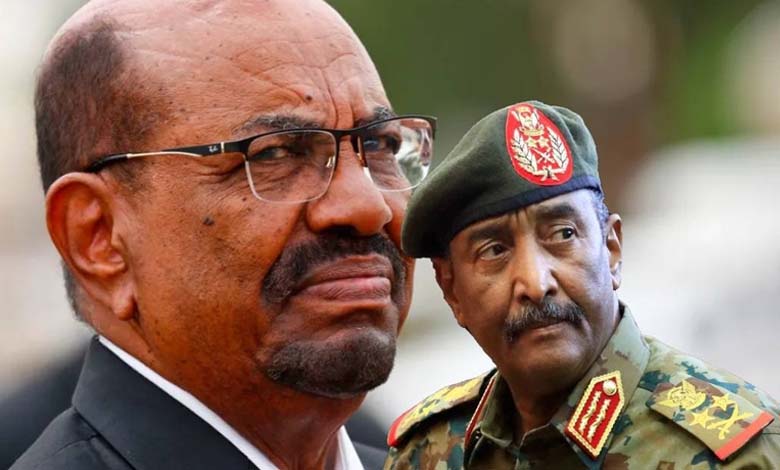From Al-Bashir to Al-Burhan: The Role of the “Kizan” in Sudan’s War

Sudanese people use the term “Kizan” to categorize various groups that have adopted different names over the decades, all of which trace their roots back to the Muslim Brotherhood. This designation unifies all these factions under one label, emphasizing that their goals, actions, and impact on the country remain consistent, regardless of the changing names adapted to fit the context of each era.
-
Al-Bashir and Colleagues’ Escape… The Muslim Brotherhood Attempts to Transfer Them to Another Hospital
-
Mohamed Atta Fadl al Moula is one of the key leaders of the Al-Bashir regime
As in every stage of Sudan’s development, the “Kizan” – now allied with the army led by Abdel Fattah Al-Burhan – are obstructing attempts to end the war that has been ongoing for two years. The continuation of the conflict secures their survival and dominance, whereas free elections would likely eliminate them from any position of power, as demonstrated during Sudan’s first democratic experience in 1986, when the Muslim Brotherhood failed to win a single seat. One of its offshoots came in third place after temporarily revising its political platform.
A History of Adaptation
The Sudanese Islamist movements, now part of what is known as the “Popular Resistance” – a cover for several armed Islamist factions rooted in the Brotherhood – have gone through several stages. They began with attempts to seize power, held it for 30 years, and eventually declined after losing all legitimacy. For Sudanese citizens, they are now simply “Kizan,” a term that originated from a statement by one of the group’s prominent leaders but later became a term of derision.
-
Escalation of Calls for Arming in Sudan… What’s the Relationship with the al-Bashir Regime?
-
Al-Bashir’s supporters are participating in the battles alongside the Sudanese army
The Brotherhood ideology entered Sudan in the mid-1940s and was officially established in 1949. It later splintered into various factions with different names, such as the “Islamic Charter Front,” the “National Islamic Front,” and the “Popular Arab Islamic Congress” led by Hassan Al-Turabi. Later came the “National Congress Party,” under which ousted President Al-Bashir ruled Sudan for 30 years. Al-Turabi later broke away and formed the “Popular Congress Party.”
These splits were driven by political necessity. Some factions tried to present a more “open” discourse, but they remained entangled in the violence that gripped the country. They also supported harsh laws, including those imposed by former President Jaafar Al-Nimeiry, who, encouraged by Islamist leaders, adopted strict Sharia-based punishments such as amputations. These policies had disastrous consequences, contributing significantly to the eventual division of Sudan and leading to Al-Nimeiry’s downfall. Islamist influence temporarily receded, only to return with the 1989 military coup led by Al-Bashir, who soon removed his key supporter and leader of the Islamic Front, Hassan Al-Turabi.
-
War in Sudan: Al-Burhan seeks assistance from former Military leaders of the al-Bashir regime
-
How do supporters of Omar al-Bashir participate in the Sudanese army?
Extremism as the Army’s Ally
Thirty years of Islamist rule under Al-Bashir and his allies ended with a mass uprising. While the protest movement ousted their regime, it did not bring stability. War returned, halting the transition to civilian governance. The Islamist groups, under various new names, played a key – though often hidden – role in this new conflict.
Al-Burhan, following in the footsteps of Al-Nimeiry and Al-Bashir, renewed his alliance with these movements. Under the guise of the “Popular Resistance,” he deployed militant groups such as “Al-Baraa Ibn Malik,” “Al-Bunyan Al-Marsous,” “Popular Security,” “Swift Lightning,” “Soldiers of Truth,” and “Supporters of the Sharia State” – all of which are extremist brigades linked to Islamist factions.
-
Abdelhay Youssef: The Muslim Brotherhood’s Killing Machine in Sudan.. al-Bashir’s Close Friend
-
Sudanese Army Under Fire: Allegations of Civilian Abuses and Obstruction of Humanitarian Aid Amid International Calls to End the War
According to a study by the Graduate Institute of International and Development Studies in Geneva, Al-Bashir established the “Popular Defense Forces” in Sudan as a legal entity in November 1989. The force reached about 100,000 fighters before being dissolved and converted into a reserve force under the Ministry of Defense on January 7, 2020.
Just as Islamist movements had contributed to the downfall of Sadiq Al-Mahdi’s government, they also sabotaged Sudan’s efforts to transition to civilian rule after Al-Bashir’s ousting. Al-Burhan not only allowed these factions to influence military decision-making, but he also deployed them in his wars, plunging most Sudanese into poverty, causing tens of thousands of deaths, and displacing millions.












